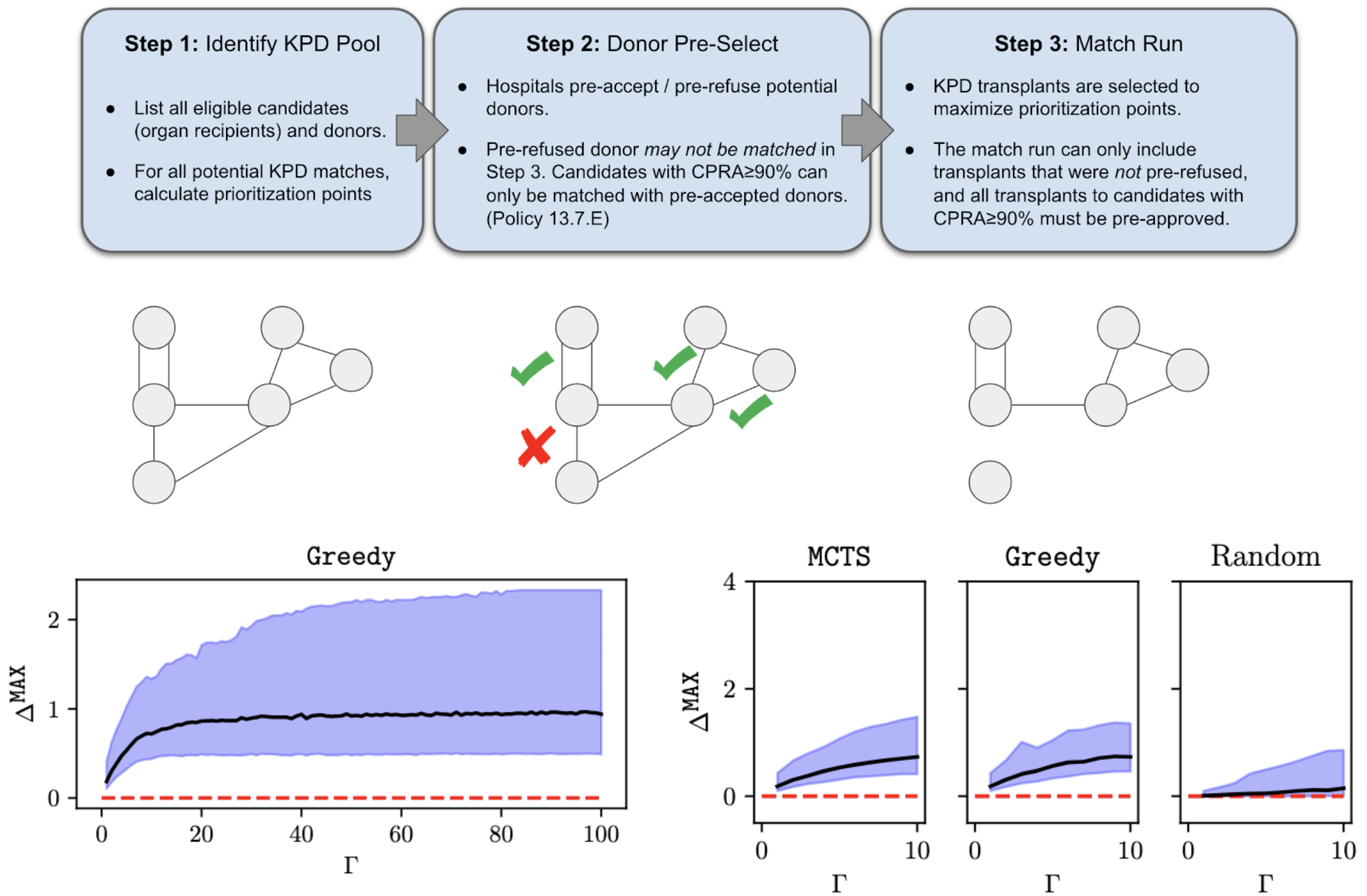Improving Policy-constrained Kidney Exchange via Pre-screening
D. C. McElfresh1, M. Curry2, S. Booker3, M. Stuart3, D. Stewart3, R. Leishman3, T. Sandholm4, J. Dickerson2
1Applied Mathematics, University of Maryland, College Park, MD, 2University of Maryland, College Park, MD, 3United Network for Organ Sharing, Richmond, VA, 4Carnegie Mellon University, Pittsburgh, PA
Meeting: 2021 American Transplant Congress
Abstract number: 316
Keywords: Allocation
Topic: Clinical Science » Organ Inclusive » Machine Learning, Artificial Intelligence and Social Media in Transplantation
Session Information
Session Name: Disparities in Access and Machine Learning Outcomes in Solid Organ Transplantation
Session Type: Rapid Fire Oral Abstract
Date: Tuesday, June 8, 2021
Session Time: 4:30pm-5:30pm
 Presentation Time: 5:05pm-5:10pm
Presentation Time: 5:05pm-5:10pm
Location: Virtual
*Purpose: Many planned kidney exchange transplants do not go to transplantation (they “fail”) for a variety of reasons, such as positive crossmatch and logistical difficulties. Failures reduce the number of transplants facilitated by exchanges, and increase patient waiting time. Avoiding failures is a challenge, as exchanges are often constrained by policy and law in how they match patients and donors.
Instead, hospitals can pre-screen potential donors prior to matching. Donors who are not rejected during pre-screening can then be matched in the exchange (Fig. 1-Top). Pre-screening requires clinicians to spend valuable time reviewing potential donors, as well as additional compatibility testing. Since each hospital can have dozens of potential donors to screen, it is important to prioritize those most important to the exchange.
*Methods: We study how to select donors for pre-screening, using a theoretical model and computational simulations. In our model each transplant has a probability of being approved/rejected during screening, and a probability of post-match failure. Using this model we estimate the value gained by pre-screening each donor (the total increase OPTN prioritization points). Values help determine which transplants are most important to pre-screen.
*Results: Selecting the most valuable donors to pre-screen is computationally hard (see our paper for details), but simple algorithms are effective in simulations. Fig. 1-Bottom shows simulation results on OPTN-KPD exchanges from 2010-2018, using our methods Greedy and MCTS, compared to a Random baseline. Horizontal axis: number of donors pre-screened; vertical axis: relative value improvement over no pre-screening,: 0 = no improvement, 1 = 100% more prioritization points, and so on. Shading shows the range over all exchanges, and solid line shows the median. in most cases, screening only 10 donors with our methods leads to a 50-100% increase in matched prioritization points. Selecting random donors yields a much smaller improvement.
*Conclusions: Pre-screenings can prevent pre-transplant failures, but cost valuable time and resources. We develop algorithms for identifying which donors provide the most value to the exchange if pre-screened. Our methods can help hospitals prioritize the most important donors to screen, and to filter out donors which cannot be matched via exchange. We are now working with the OPTN KPD program to implement these methods in a pilot test.
To cite this abstract in AMA style:
McElfresh DC, Curry M, Booker S, Stuart M, Stewart D, Leishman R, Sandholm T, Dickerson J. Improving Policy-constrained Kidney Exchange via Pre-screening [abstract]. Am J Transplant. 2021; 21 (suppl 3). https://atcmeetingabstracts.com/abstract/improving-policy-constrained-kidney-exchange-via-pre-screening/. Accessed February 28, 2026.« Back to 2021 American Transplant Congress

